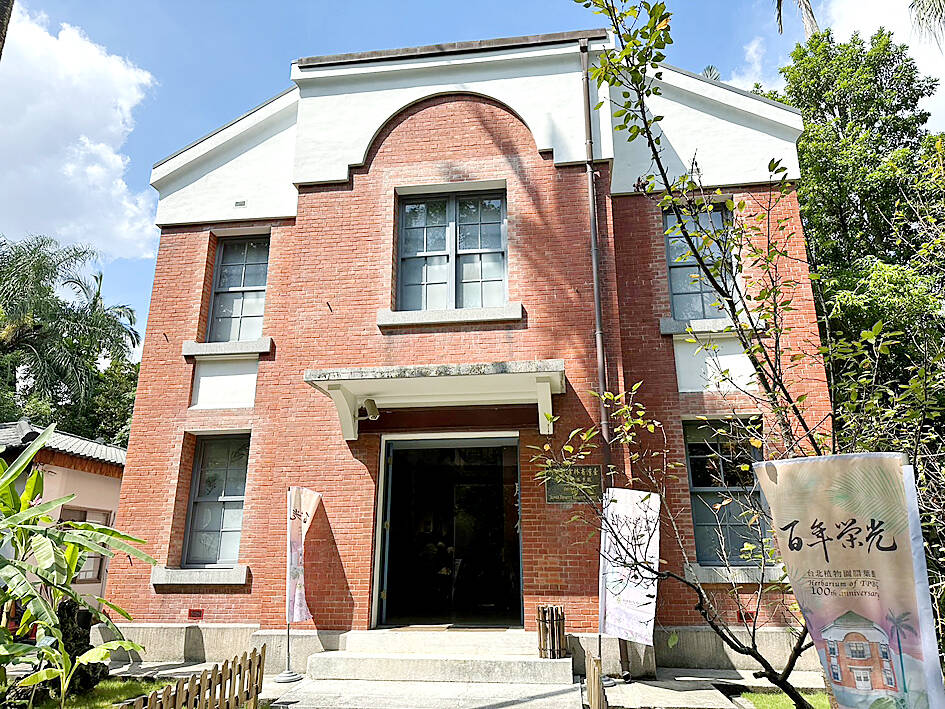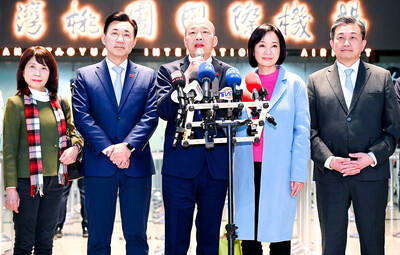The largest collection of plant specimens in Taiwan, the Taipei Botanical Garden’s herbarium, is celebrating its 100th anniversary with an exhibition that opened on Friday.
The herbarium provides critical historical documents for botanists and is the first of its kind in Taiwan, Taiwan Forestry Research Institute director Tseng Yen-hsueh (曾彥學) said.
It is housed in a two-story red brick building, which opened during 1924.

Taipei Times
At the time, it stored 30,000 plant specimens from almost 6,000 species, including Taiwanese plant samples collected by Tomitaro Makino, the “father of Japanese botany,” Tseng said.
The herbarium collection has grown in the century since its founding, because of the efforts of researchers such as Cheng Tsung-yuan (鄭宗元), Lu Chin-ming (呂錦明), Chang Hui-chu (張惠珠), Yang Yuan-po (楊遠波) and Chiu Wen-liang (邱文良), Tseng added.
The herbarium holds more than 560,000 specimens of all shapes and sizes, more than can be fit into the two-story building, so most have been moved to a different research facility, and all have been digitized for online visitors, he said.
The specimens offer modern botanists insights into the historical context and environment in which they were discovered. For example, the herbarium is home to plants such as the Wulai azalea (Rhododendron kanehirai), which was endemic to Taiwan, but is now extinct in the wild.
The herbarium is a must-visit for aspiring botanists in Taiwan, serves as a central hub for research and is an essential resource for plant taxonomy, Chiu said.
Aside from publications of Taiwanese botany, the exhibition is to run until the end of the year and would showcase atlases published in the past century, from the Japanese colonial period to the present.

TRAGEDY: An expert said that the incident was uncommon as the chance of a ground crew member being sucked into an IDF engine was ‘minuscule’ A master sergeant yesterday morning died after she was sucked into an engine during a routine inspection of a fighter jet at an air base in Taichung, the Air Force Command Headquarters said. The officer, surnamed Hu (胡), was conducting final landing checks at Ching Chuan Kang (清泉崗) Air Base when she was pulled into the jet’s engine for unknown reasons, the air force said in a news release. She was transported to a hospital for emergency treatment, but could not be revived, it said. The air force expressed its deepest sympathies over the incident, and vowed to work with authorities as they

A tourist who was struck and injured by a train in a scenic area of New Taipei City’s Pingsi District (平溪) on Monday might be fined for trespassing on the tracks, the Railway Police Bureau said yesterday. The New Taipei City Fire Department said it received a call at 4:37pm on Monday about an incident in Shifen (十分), a tourist destination on the Pingsi Railway Line. After arriving on the scene, paramedics treated a woman in her 30s for a 3cm to 5cm laceration on her head, the department said. She was taken to a hospital in Keelung, it said. Surveillance footage from a

BITTERLY COLD: The inauguration ceremony for US president-elect Donald Trump has been moved indoors due to cold weather, with the new venue lacking capacity A delegation of cross-party lawmakers from Taiwan, led by Legislative Speaker Han Kuo-yu (韓國瑜), for the inauguration of US president-elect Donald Trump, would not be able to attend the ceremony, as it is being moved indoors due to forecasts of intense cold weather in Washington tomorrow. The inauguration ceremony for Trump and US vice president-elect JD Vance is to be held inside the Capitol Rotunda, which has a capacity of about 2,000 people. A person familiar with the issue yesterday said although the outdoor inauguration ceremony has been relocated, Taiwan’s legislative delegation has decided to head off to Washington as scheduled. The delegation

Another wave of cold air would affect Taiwan starting from Friday and could evolve into a continental cold mass, the Central Weather Administration (CWA) said yesterday. Temperatures could drop below 10°C across Taiwan on Monday and Tuesday next week, CWA forecaster Chang Chun-yao (張竣堯) said. Seasonal northeasterly winds could bring rain, he said. Meanwhile, due to the continental cold mass and radiative cooling, it would be cold in northern and northeastern Taiwan today and tomorrow, according to the CWA. From last night to this morning, temperatures could drop below 10°C in northern Taiwan, it said. A thin coat of snow